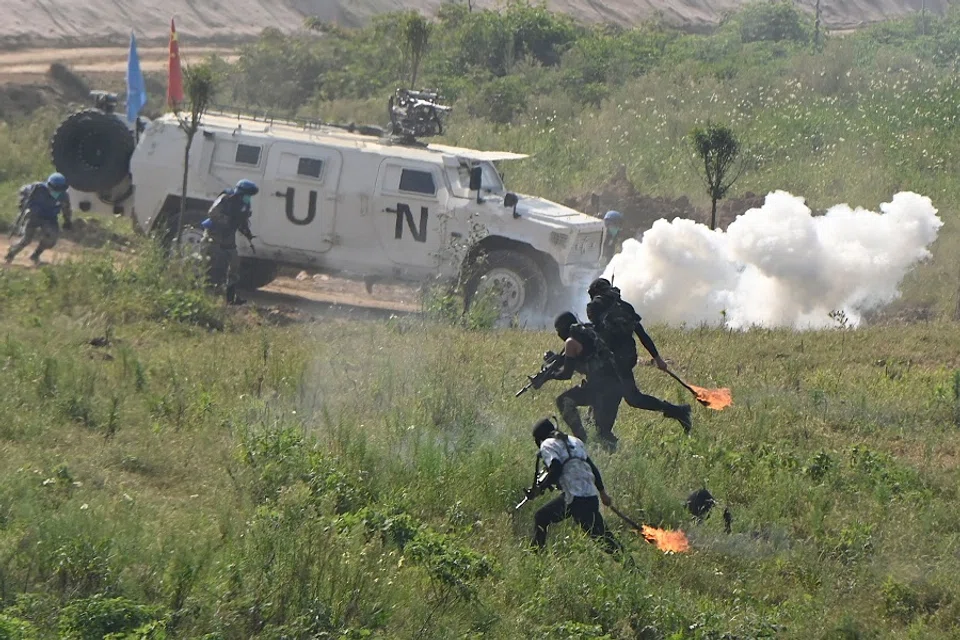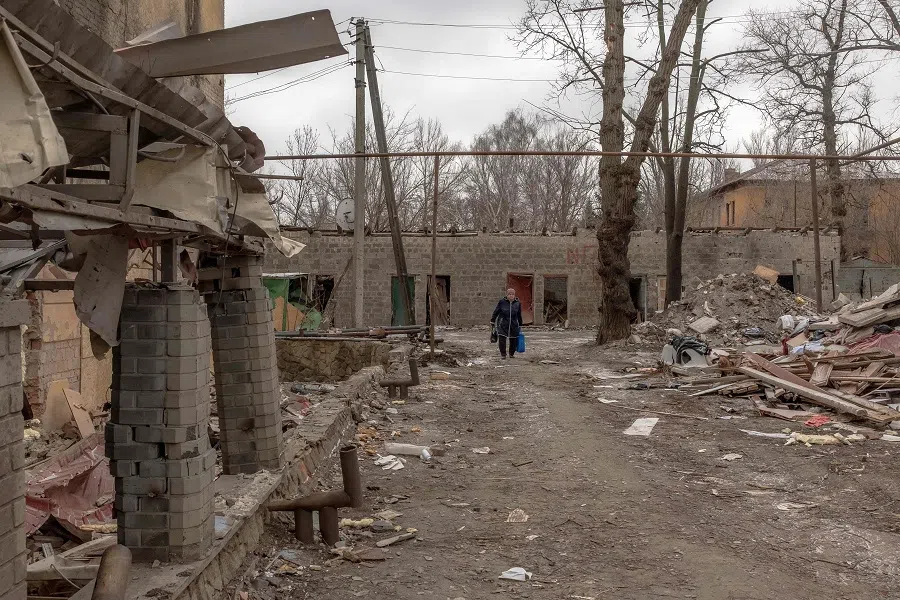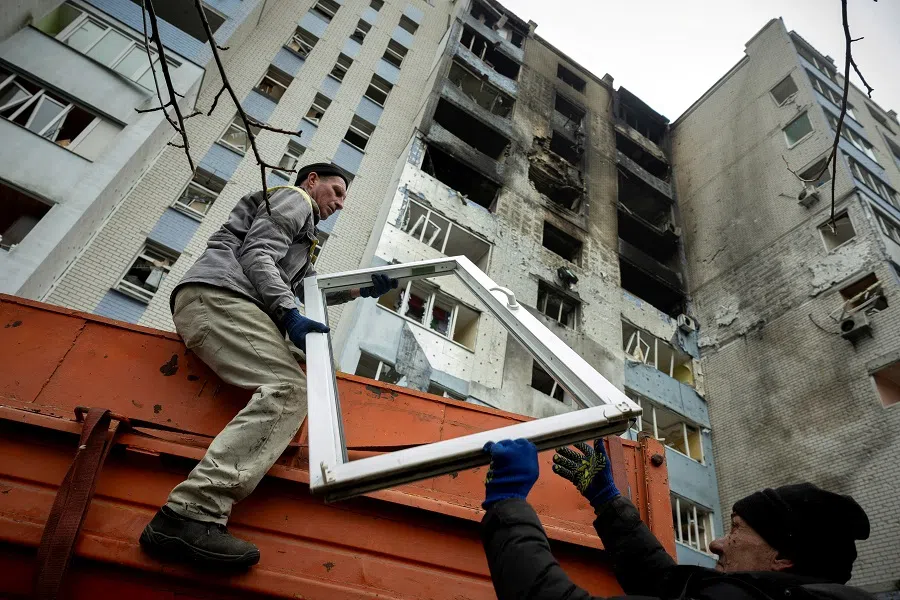Why China won’t send a peacekeeping force to Ukraine
There is a suggestion that China could send a peacekeeping force to Ukraine once the fighting stops. However, this is not a straightforward matter as Ukraine and Russia would first have to agree to a Chinese presence. There is the further issue of how a Chinese peacekeeping force would fit into a bigger European contingent. ISEAS researcher Lye Liang Fook examines the issue.

Due to US pressure on President Volodymyr Zelenskyy to reach a quick deal with Russia to end the Ukraine war, there is now talk about a ceasefire and what this entails. There is even a suggestion that China could play a peacekeeping role.
China’s foreign ministry spokesperson’s reply that China does not comment on the hypothetical question of whether it will deploy its servicemen as part of a peacekeeping force in Ukraine seems to suggest that Beijing is keeping its options open. While China is no stranger to peacekeeping operations, stationing troops in Ukraine is no straightforward matter.
A more likely scenario is a non-UN sanctioned peacekeeping force, comprising largely of troops from the European countries, that is being talked about. If so, Beijing will find it more difficult to be part of such a force...
China’s peacekeeping operations
At the global level, China has consistently attempted to portray itself as a predictable, reliable and responsible member of the international community, especially under the aegis of the United Nations (UN). For a start, China ranks second at 18.69%, after the US at 26.95%, in terms of assessed contributions to UN peacekeeping operations.
China further ranks eighth with a total of 1,799 uniformed personnel (including troops) to the UN who are deployed to various war-torn countries. This figure makes it the largest contributor of peacekeeping personnel among the UN Security Council members, well ahead of the US at 81st position with only 21 personnel. Apparently, by 2017, China had a standby peacekeeping force of 8,000 troops ready to be deployed to trouble spots around the world in keeping with a commitment made by Chinese President Xi Jinping in 2015.
Beijing has scored a few notable firsts in promoting international peace and security. Since December 2008, China has undertaken 47 rounds of anti-piracy operations off the Gulf of Aden. These undertakings are intended not only to showcase China’s contributions to global maritime security and its ability to protect international commercial shipping and supply routes but also project China’s naval presence and diplomacy well beyond its shores. In another first, in 2014, China’s navy, under UN aegis and the Organisation for the Prevention of Chemical Weapons (OPCW), helped to escort the transport of Syria’s chemical weapons enroute to their safe destruction.
UN or non-UN sanctioned
One possible scenario is a peacekeeping force in Ukraine sanctioned by the UN Security Council (UNSC). However, this is unlikely because Russia, a UNSC member, is expected to oppose any resolution authorising such a force. A force, authorised by the UNSC, would be an admission that Russia was wrong to invade Ukraine in the first place. It would further obstruct Moscow’s ambitions to take over more territories in Ukraine in the future.
A more likely scenario is a non-UN sanctioned peacekeeping force, comprising largely of troops from the European countries, that is being talked about. If so, Beijing will find it more difficult to be part of such a force as it usually justifies its participation under UN authorisation.
Clearly, Kyiv does not regard China as a credible mediator.

Ukraine’s objection
China has urged the warring parties to settle their differences at the negotiating table and tabled related proposals. So far, its 2023 12-point position paper and 2024 joint peace proposal with Brazil, which have generally been welcomed by Russia, have been rejected by Kyiv. The rejection stems from these documents’ failure to condemn Russia for its invasion of Ukraine and their non-recognition of the territorial integrity and sovereignty of Ukraine.
In his address to the UN General Assembly in September 2024, President Volodymyr Zelenskyy dismissed the China-Brazil peace proposal and any proposal that does not take into account Ukraine’s interests as akin to imposing a brutal colonial past on Ukraine. Clearly, Kyiv does not regard China as a credible mediator.
Furthermore, China’s provision of dual-use goods and other forms of support, which has enabled Russia to continue its war of aggression, has further tarnished Beijing’s reputation in the eyes of Kyiv. Given this distrust, it is highly unlikely that Kyiv will consent to Chinese peacekeeping forces being stationed on Ukrainian soil.
America’s backstop and implications
China’s contribution of a peacekeeping force would require the US, especially Trump, to agree to it as well. Trump has unequivocally stated that Europe must take the central role in assuring Ukraine’s long term security. Europe seems ready to do more provided there is some form of American backstop although the nature of the US presence remains uncertain.
Some US officials have reportedly floated the idea of including non-European countries, such as China and Brazil, to make the peacekeepers more balanced and palatable for Moscow. It is unclear whether this is an official US position or a proposal floated merely to get Moscow to the negotiating table.
While there could be some value in having a Chinese presence, the optics for Beijing would not look good if there is some form of US security presence. The Chinese peacekeeping force, if it is deployed, could be perceived as playing “second fiddle” as they would be coming under the “overall protection” of the US. Such a perception may not go down well with Beijing as China regards itself as a big power more than capable of underwriting its own security.
... it would be difficult, almost impossible, for the Chinese to operate independently if it were to be part of a peacekeeping force comprising largely of European troops.
Challenges for Chinese peacekeepers in European-led mission
There is the issue of how a Chinese peacekeeping force would collaborate with a bigger European contingent to grapple with. More likely, the European contingent would be headed by a European commander with a line to the Americans since the US is expected to have some form of presence. Under this set-up, it is hard to envisage how a Chinese peacekeeping force would fit in.
In the anti-piracy operations off the Gulf of Aden, the Chinese Navy operates as an independent force outside of the Combined Task Force (CTF) 151 that is rotated among participating countries on a three to six month basis, and which falls under the US-led Combined Maritime Forces. This arrangement affords China the flexibility to operate outside US-led coalitions while contributing to UN efforts to combat piracy in international waters.
However, it would be difficult, almost impossible, for the Chinese to operate independently if it were to be part of a peacekeeping force comprising largely of European troops. For one, the Europeans especially Ukraine, would want to have control over the forces operating in its territory. Moreover, Beijing may not take too kindly to the idea of a Chinese contingent taking orders from a European commander as it could conjure up memories of the years of national humiliation China suffered at the hands of the Western powers in the past.
More likely, China could help Ukraine in its reconstruction efforts once the fighting stops...

Russia’s concerns
Another player China would have to contend with is Russia. Despite their no-limits partnership and affirmation that their relationship has its own dynamics independent of any third party or external factors, China would need to be careful in positioning itself in a post-war Ukraine.
If it were to contribute a peacekeeping force, China could be seen by Moscow as aligning with the West to check Russia’s future westward expansion. This would undercut the goodwill China has painstakingly built up with Russia over the years, especially since Chinese President Xi assumed office in 2012. Chinese forces could also come under direct fire if Russia were to decide one day to take over more territories in Ukraine.
Furthermore, dispatching a peacekeeping force to Ukraine would likely subject the Chinese Communist Party and the government to greater domestic criticisms of why China should be involved in an undertaking on Western soil when more should be done to help ordinary Chinese affected by the challenging state of the Chinese economy.
Unless the above factors are addressed in some way, it will be difficult to foresee China committing peacekeeping troops to Ukraine. More likely, China could help Ukraine in its reconstruction efforts once the fighting stops such as in humanitarian aid provision (including in the areas of food, healthcare and housing), de-mining operations, infrastructure building (such as airports, roads, bridges and power stations), human resource capacity training, and trade and investment promotion.





